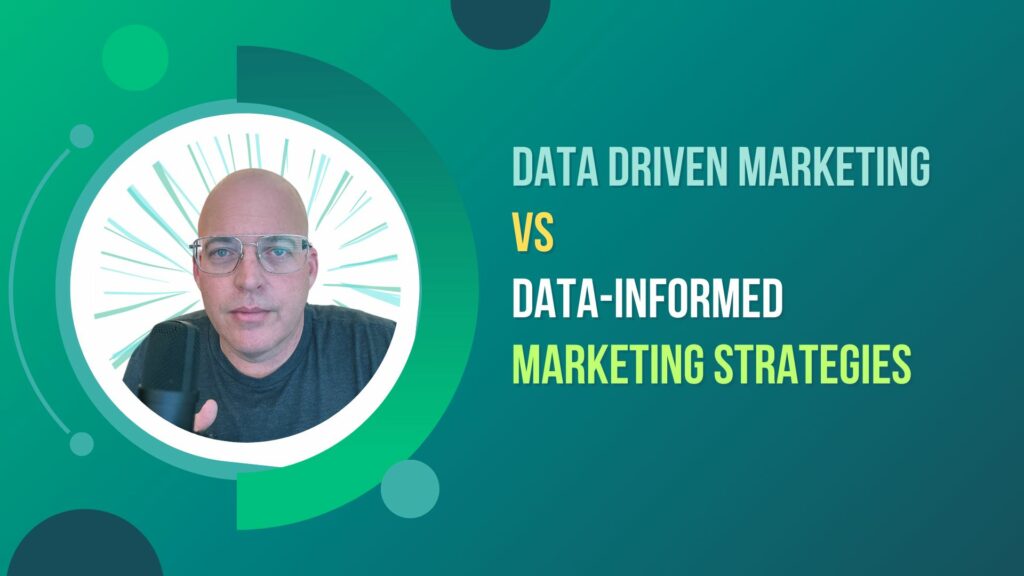Data-driven marketing uses data to guide and optimize marketing decisions. It involves leveraging customer information, such as demographics, behavior, and preferences, to develop targeted campaigns and personalized experiences. By utilizing data, marketers can make informed choices about messaging, channel selection, and budget allocation, leading to more effective and efficient marketing efforts.
On the other hand, data-informed marketing refers to a strategy that incorporates data analysis and insights into the decision-making process. While it shares similarities with data-driven marketing, data-informed marketing emphasizes the role of human expertise and judgment in interpreting and applying the data. Rather than relying solely on data to dictate marketing actions, this approach takes a more holistic view, combining data-driven insights with creativity and intuition.
Data plays a pivotal role in modern marketing strategies, regardless of whether they are data-driven or data-informed. In today’s digital landscape, where consumers generate vast amounts of data through their online interactions, businesses can harness this information to gain a competitive edge. Data provides valuable insights into customer preferences. It allows marketers to understand their target audience better and tailor their messages accordingly. By analyzing data, marketers can identify trends, uncover hidden patterns, and anticipate customer needs, enabling them to deliver more relevant and personalized experiences.
Data-Driven Marketing Strategy
Definition and Characteristics of a Data-Driven Marketing Strategy
A data-driven marketing strategy is a dynamic and results-oriented approach that systematically analyzes and utilizes data to inform and optimize marketing decisions. This strategy harnesses the power of data to gain insights related to customer behavior, preferences, and market trends. Businesses can deeply understand their target audience. It collects and analyzes data from various sources, such as customer interactions, website analytics, social media engagement, and purchase history.
Characterized by its reliance on data, a data-driven marketing strategy emphasizes the importance of evidence-based decision-making. Marketers leverage data to guide their choices, ensuring they are grounded in objective information. This approach enables businesses to move beyond assumptions and make informed decisions that are more likely to resonate with their customers.
Key Components of a Data-Driven Marketing Strategy
A successful data-driven marketing strategy comprises several components that work together seamlessly to drive meaningful results. The first component is data collection and analysis, which involves gathering relevant information from various sources and analyzing it to extract valuable insights.
Segmentation and targeting are part of a data-driven marketing strategy. Once the data has been analyzed, marketers can segment their audience based on demographics, behavior, preferences, or other relevant criteria.
Personalization is a powerful aspect of data-driven marketing. Marketers can deliver highly personalized customer experiences based on insights and marketing gain.
Testing and optimization are integral to a data-driven marketing strategy. Marketers continually test different variables, such as messaging, imagery, calls-to-action, or channel selection, to identify the most effective combinations.
Benefits of a Data-Driven Marketing Strategy
Implementing a data-driven marketing strategy offers many benefits that can significantly impact a business’s success. Firstly, it leads to improved decision-making by providing marketers with valuable insights derived from data analysis.
Secondly, a data-driven approach enables enhanced customer targeting. Marketers can identify segments with distinct characteristics, preferences, and behaviors by analyzing customer data.
Furthermore, data-driven marketing strategies boost campaign effectiveness. By leveraging data, marketers can identify patterns, trends, and correlations that inform campaign optimization. They can pinpoint the most effective messages, creative elements, and delivery channels, fine-tuning their campaigns to resonate with their audience.
Lastly, a data-driven marketing strategy delivers a higher return on investment (ROI). Businesses can allocate their resources more efficiently by utilizing data to guide decision-making and optimize campaigns. They can identify underperforming initiatives and reallocate budgets and efforts to areas that generate better results. As a result, marketing investments yield higher returns, ensuring that every dollar spent is utilized effectively.

Data Informed Marketing Strategy
Definition and Characteristics of a Data-Informed Marketing Strategy
A data-informed marketing strategy refers to an approach that combines the power of data analysis with human expertise to drive marketing decisions. In this strategy, data is a valuable tool to provide insights and guide marketers in making informed choices. However, unlike a solely data-driven approach, a data-informed strategy recognizes the importance of human judgment and creativity in interpreting and applying the data.
A data-informed marketing strategy’s key characteristic is its ability to balance quantitative data analysis and qualitative factors. While data analysis is crucial, marketers leverage their experience, intuition, and industry knowledge to make sense of the data. Another characteristic of a data-informed strategy is its adaptability and flexibility. Marketers understand that data is not static; it is subject to change as customer preferences, market trends, and competitive landscapes evolve.
Key Components of a Data-Informed Marketing Strategy
A data-informed marketing strategy comprises several components that help marketers make strategic decisions based on a deep understanding of the market, customers, competitors, and industry trends. The first component is market research and analysis, which involves gathering and analyzing data to identify market size, customer segments, and target demographics. This information provides marketers with a solid foundation for developing effective marketing campaigns.
Customer insights form another component of a data-informed marketing strategy. Gain valuable insights related to customer behavior, preferences, and needs by collecting and analyzing customer data. This includes data from various touchpoints such as website interactions, social media engagements, and purchase history. Customer insights help marketers develop personalized and targeted marketing campaigns that resonate with their audience more deeply.
Competitive analysis is another element of a data-informed marketing strategy. Marketers can gain a competitive edge by gathering data on competitors’ marketing tactics, messaging, and positioning. They can identify opportunities to differentiate their products or services and develop strategies highlighting their unique value proposition. Understanding the competitive landscape enables marketers to position their brands effectively and make informed decisions on standing out in the market.
Finally, a data-informed marketing strategy must stay informed about industry trends and benchmarks. Marketers monitor industry trends, consumer behavior shifts, and emerging technologies. By analyzing industry benchmarks, such as conversion rates or customer acquisition costs, marketers can gauge their performance against industry standards. It also identifies areas for improvement.
Benefits of a Data-Informed Marketing Strategy
Implementing a data-informed marketing strategy offers many benefits that can positively impact a business’s success. It enables marketers to understand the market and customers better. By analyzing data, marketers can uncover valuable insights about market trends, customer preferences, and purchasing behaviors.
A data-informed strategy also enables contextual decision-making. Marketers can make decisions based on real-time data, allowing them to respond to changing market dynamics and customer needs. This agility ensures that marketing efforts are aligned with the current context, maximizing their relevance and impact.
A data-informed marketing strategy helps mitigate risks. By relying on data and insights, marketers can identify potential pitfalls and challenges, enabling them to make more informed and calculated decisions.
Comparison and Integration
There are notable differences when it comes to data-driven and data-informed marketing strategies. A data-driven approach relies heavily on data as the primary driver of decision-making. It emphasizes quantitative analysis and uses data to dictate marketing actions. On the other hand, a data-informed strategy acknowledges the importance of data but also values human expertise, intuition, and qualitative insights when making marketing decisions. It strikes a balance between data analysis and human judgment.
While these two approaches have distinct characteristics, they can complement each other. Synergies arise when data-driven strategies provide valuable insights and serve as a foundation for a data-informed system. The data-driven analysis offers objective information that guides decision-making, while data-informed strategies incorporate creative thinking and contextual understanding to interpret and apply the data effectively. By combining both approaches, marketers can harness the power of data while leveraging human expertise to make strategic marketing decisions.
Balancing Data-Driven and Data-Informed Approaches
Balancing data-driven and data-informed approaches is essential for effective marketing strategies. While data-driven strategies provide valuable insights and quantitative analysis, they can sometimes overlook the nuanced aspects of human behavior and the contextual factors that influence consumer decisions. Achieving the right balance ensures that marketing decisions are well-informed, leveraging data-driven insights and human understanding to create impactful and resonant campaigns.
Looking toward the future, integrating data-driven and data-informed approaches will continue to play a significant role in marketing strategies. As technology advances, data availability increases, and customer expectations evolve, marketers must adapt their practices accordingly. Artificial intelligence will continue to enhance data analysis capabilities, providing marketers with deeper insights and predictive capabilities. This will enable more personalized and tailored marketing efforts, fostering stronger customer connections.








